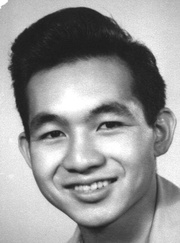
Base de Datos de Experiencias Militares de Japoneses Americanos

Mamoru "John" Fujioka
Sexo
Male
Fecha de Nacimiento
1925-6-29
Lugar de Nacimiento
Olaa HI, U.S.A.
Inducted
1944-1-3, Honolulu HI
Tipo de Alistamiento
Volunteer
Afiliación Militar
Army
Tipo de servicio prestado
War
Tipo de unidad militar
Support
Unidades a las que sirvió
PACMIRS (Pacific Military Intelligence Research Section)
Especialidad militar
Translator 267 (Japanese Language) and Intelligence NCO-631
Asignado
USA: Camp Savage and Ft. Snelling, MN; Camp Ritchie, MD; Ft. Myer, VA; Ft. Shafter, HI
Other Countries: Japan - Sendai, Morioka,
Other Countries: Japan - Sendai, Morioka,
Retirado
Honolulu HI
Responsabilidad en la unidad
Collecting and researching military data.
Responsabilidad individual
Collecting and evaluating all Japanese military info secured by U.S. Intellligence and reconnaisance units.
Batallas principales (si sirvió en una zona de guerra)
Did not go to war zone (Japan) until Nov. '45, when war was over.
Reconocimientos, medallas, menciones (individuales o de la unidad)
World War II Victory Medal
Asiatic-Pacific Campaign Ribbon
Good Conduct Medal
Army Commendation Ribbon
American Campaign Medal
Asiatic-Pacific Campaign Ribbon
Good Conduct Medal
Army Commendation Ribbon
American Campaign Medal
Condiciones de Vida
Lived in close quarters. Slept together in barracks, or cramped up to 4 in small hotel-like rooms, like at the YUSEN Bldg. in Tokyo, or hotel rooms in other Japanese cities like Morioka and Sendai.
In barracks, bathing was communal.
Meals were good but fattening. Can't drink beer and hated bars, so went to movies or stage shows.
In barracks, bathing was communal.
Meals were good but fattening. Can't drink beer and hated bars, so went to movies or stage shows.
Recuerdo más vívido de la experiencia militar
Had no basic training, so when going overseas to Japan, they sent us M.I.S. members to the firing range, taught us how to hold a rifle, and shoot at a target. None of us could shoot at the targets, of course, and we had 'Maggies' drawers' flying all over the place. So, we were sent to Japan right after the war and our records read 'shot M1 rifle, unqualified' - but that qualified us to be sent overseas without any basic training.
Wherever we were stationed in the U.S. (MN, MD, VA), we were treated extremely well by the locals - even got invited to haole homes for dinners. It was good to know that most Americans were not racists.
Lo que más extraño durante su tiempo en las fuerzas armadas
My family in Hawaii.
¿En lo personal, qué obtuvo de su experiencia militar?
That I volunteered for service in the U.S. Army during wartime and willingly placed my life on the line when my country needed me the most. That I did this not only for myself, but for my family and those close to me and for their ancestors.
Información adicional
I was born a homosexual, and was able to serve in the military service with honor and dignity. At no time did any of my comrades, with whom I lived in extremely close quarters, feel intimidated by my presence. I feel it very important that I state this, as I feel that the military or any ban on homosexuality is a civil rights issue and not a moral issue at all.


